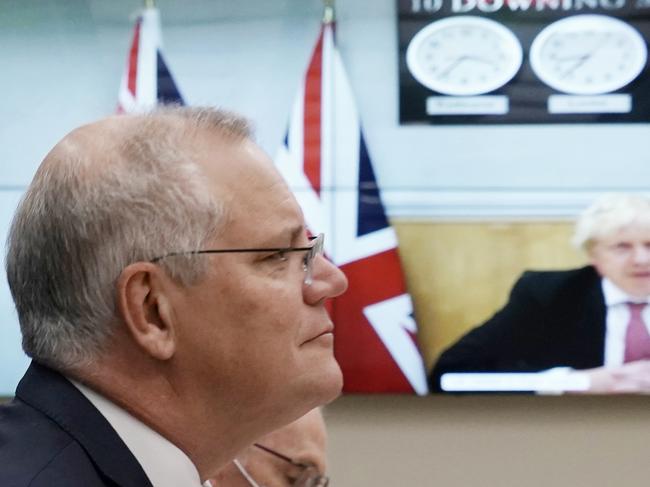Federal Budget 2022: $10b spent on cybersecurity to fight hackers
Australia is stepping up its war front against foreign adversaries like Russia and China with a “real increase in potency”.
Security
Don't miss out on the headlines from Security. Followed categories will be added to My News.
Australia’s cybersecurity force will get a massive boost, with almost $10bn given to the Australian Signals Directorate to fight back against hackers, spies and malign attacks from foreign adversaries including China and Russia.
Project REDSPICE will almost double the size of the ASD, recruiting 1900 people over the next decade to boost Australia’s capacity to defend itself from cyber attacks, and launch its own cyber attacks if required.
The nation’s new geek army will be tasked with hunting and disabling cyber attackers, protecting Australia’s critical infrastructure, and launching counter offensives in cyberspace if Australia was to come under cyber attack.
Defence Minister Peter Dutton said Project REDSPICE (which stands for Resilience, Effects, Defence, Space, Intelligence, Cyber and Enablers) would bolster the Morrison government’s commitment to its Five Eyes intelligence-sharing partners, its partners in the AUKUS agreement (Britain and the US), and support a “secure Indo-Pacific region’’. He said ASD’s offensive cyber capabilities would be tripled and its cyber response and hunting activities doubled.

“REDSPICE ensures Australia keeps pace with the rapid growth of cyber capabilities of potential adversaries,’’ he said.
“It provides new intelligence capabilities, new cyber defences to protect our most critical systems, and is a real increase in the potency of ASD’s ability to strike back in cyberspace.”
Intelligence agencies have repeatedly warned of the potential for adversaries such as China, Russian, Iran or North Korea to launch a crippling cyber attack on Australia.
The ASD, previously known as the Defence Signals Directorate, has the power to launch offensive cyber operations of its own, and is increasingly seen as being on the front line of any potential conflict.
“It acknowledges the nature of the conflict has changed, with cyber attacks now commonly preceding other forms of military intervention – most recently demonstrated by offensive cyber activity against Ukraine,’’ Mr Dutton said.

The budget papers spelled out $4.2bn in spending over the forward estimates, although $3.6bn of that was moved across from the Department of Defence’s Integrated Investment Program.
Assistant Defence Minister Andrew Hastie said Project REDSPICE was a “critical investment in our digital sovereignty’’ and would provide highly skilled jobs to equip the next generation of Australians to defend the nation’s critical infrastructure.
“The Morrison government’s investment in the ASD will allow our cyber operators to punch back at our adversaries and protect Australia and our interests online,’’ he said.
The $9.9bn funding package will see the government develop partnerships with educational institutions in the areas of data science and analysis, artificial intelligence, cyber security, and ICT engineering.

The budget papers noted the investment in a new cyberforce comes “amid a deteriorating geostrategic environment and economic disruption’’.
It was one of several expensive and long-term projects outlined in the budget which aim to better position Australia against an increasingly expansionist China.
This includes a promise to grow the Australian Defence Force by a third, an increase of 18,500 personnel by 2040, at a cost of $38bn.
The budget sets aside $4.3bn to build a large vessel dry berth in Western Australia. As part of the AUKUS agreement, the government has committed to building a new $10bn submarine base on the east coast, with a short-list of sites identified in Brisbane, Newcastle and Port Kembla.
The budget also includes the $65.2m already set aside to build a new chancery for the Australian High Commission in Honiara, as Australia seeks to strengthen diplomatic ties with the Solomon Islands government and dissuade it from allowing China to establish a naval base there.

In other commitments, the budget provides $6.7m next year from the defence budget to support the work of the Office of the Special Investigator, which is examining allegations that war crimes were committed by some Special Forces soldiers in Afghanistan.
The total defence budget for 2022-2023 was set down at $48bn, including $9.8bn of net capital investment.
By 2025-2026, the figure will rise to $54.5bn, of which $10bn will be net capital investment, mainly acquisition of military equipment.
This will include spending of $1bn on Self-Propelled Howitzers and Armoured Ammunition Resupply Vehicles for the army.
The government will also spend $3.5bn to buy up to 75 M1A2 Abrams tanks, 29 Assault Breacher Vehicles, 17 Joint Assault Bridge Vehicles and an additional six Armoured Recovery Vehicles.
The Budget papers give no indication on what the nuclear submarines promised under the AUKUS agreement would cost. There is also no indication given on the initial costs associated with the massive ADF recruitment blitz, which will mostly occur outside the forward estimates.
More Coverage
Originally published as Federal Budget 2022: $10b spent on cybersecurity to fight hackers





